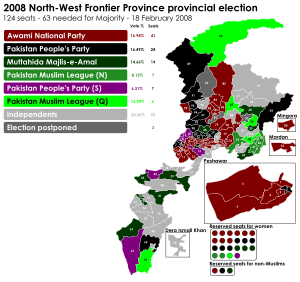2008 North-West Frontier Province provincial election
 From Wikipedia - Reading time: 6 min
From Wikipedia - Reading time: 6 min
| |||||||||||||||||||||||||||||||||||||||||||||
All 124 seats in the Provincial Assembly 63 seats needed for a majority | |||||||||||||||||||||||||||||||||||||||||||||
|---|---|---|---|---|---|---|---|---|---|---|---|---|---|---|---|---|---|---|---|---|---|---|---|---|---|---|---|---|---|---|---|---|---|---|---|---|---|---|---|---|---|---|---|---|---|
| |||||||||||||||||||||||||||||||||||||||||||||
 Results of the Election by constituency | |||||||||||||||||||||||||||||||||||||||||||||
| |||||||||||||||||||||||||||||||||||||||||||||
Provincial elections were held in the North-West Frontier Province to elect the members of the 9th Provincial Assembly of North-West Frontier Province on 18 February 2008, alongside nationwide general elections and three other provincial elections in Sindh, Balochistan, and Punjab. The remaining two territories of Pakistan, AJK and Gilgit-Baltistan, were ineligible to vote due to their disputed status. These were the last elections held under the provincial name "North-West Frontier Province", later changed to Khyber Pakhtunkhwa following the Eighteenth Amendment to the Constitution of Pakistan. [1]
The elections resulted in a hung parliament with the Awami National Party (ANP) being the largest party. The ANP was able to form a coalition government with the Pakistan People's Party (PPP) after winning reserved seats for women and non-Muslims, and their candidate for the Chief Minister position, Haider Khan Hoti, was elected unopposed.[2][3]
Results
[edit]| Party | Votes | % | Seats | |||||
|---|---|---|---|---|---|---|---|---|
| General | Reserved for women | Reserved for non-Muslims | ||||||
| Awami National Party | 578,405 | 16.94 | 31 | 9 | 1 | |||
| Pakistan Peoples Party | 563,057 | 16.49 | 17 | 6 | 1 | |||
| Muttahida Majlis-e-Amal | 500,479 | 14.66 | 10 | 3 | 1 | |||
| Pakistan Muslim League (Q) | 440,518 | 12.90 | 5 | 1 | 0 | |||
| Pakistan Muslim League (N) | 277,559 | 8.13 | 5 | 2 | 0 | |||
| Pakistan Peoples Party (S) | 215,474 | 6.31 | 6 | 1 | 0 | |||
| Other parties | 10,373 | 0.30 | 0 | 0 | 0 | |||
| Independents | 828,317 | 24.26 | 22 | 0 | 0 | |||
| Election postponed | 3 | – | – | |||||
| Total | 3,414,182 | 100.00 | 99 | 22 | 3 | |||
| Source: Free and Fair Election Network (FAFEN) | ||||||||
Aftermath
[edit]The Awami National Party (ANP) and the Pakistan People's Party (PPP) emerged as the two largest parties in the assembly and therefore, they jointly formed a coalition government in the province. The ANP's Haider Khan Hoti was elected unopposed as the Chief Minister of the North-West Frontier Province, due to no other party fielding a candidate for the chief ministerial election. Furthermore, Kiramat Ullah Khan of the PPP and Khush Dil Khan of the ANP were elected as the Speaker and Deputy Speaker, respectively Moreover, former Chief Minister Akram Khan Durrani of the Muttahida Majlis-e-Amal (MMA) became the Leader of the Opposition.[4]
References
[edit]- ^ "An Overview, KP Assembly". www.pakp.gov.pk. Retrieved 5 August 2021.
- ^ Yusufzai, Ashfaq (1 March 2008). "ANP names Amir Hoti for Frontier CM post". DAWN.COM. Retrieved 13 September 2023.
- ^ "Hoti elected unopposed leader of house in NWFP". Brecorder. 2 April 2008. Retrieved 13 September 2023.
- ^ "Hoti elected unopposed leader of house in NWFP". Brecorder. 2 April 2008. Retrieved 13 September 2023.
 KSF
KSF

